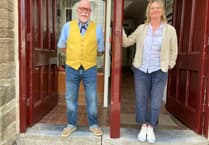UNDERGRADUATE students have returned to Dartington for the first time since the acclaimed college of arts closed in 2010.
Following the 12 year hiatus, the new students arrived last week ready to embark on a three-year BSc Regenerative Food and Farming degree.
They will be staying at the Old Postern site at Schumacher College for the duration, learning from experts in the field and exploring the rich patchwork of farming and food production projects based on the estate and nearby.
Course leader Dr Simon Platten said: “It’s so exciting to have the students actually here in person at Dartington.
“So much work has gone into developing this course over the past few years, from the initial planning of the learning programme and accreditation process with our partner University of Plymouth, right through to enrolling the students last week, so to start the actual teaching now feels like a momentous occasion.
“So many people have been involved so far, and I’ve be really looking forward to taking up the baton as we start to interrogate really fundamental questions with the students, from the best ways for us to produce the food we eat, to defining the role the farming sector can play in improving the health of our planet.”
The new programme is one of the first degrees in the UK to teach students exclusively nature-friendly approaches to farming through a blend of practical, hands-on learning, and theoretical exploration of the science behind the latest agroecological innovations.
The degree joins the ten postgraduate degrees currently available at Dartington, with more in the pipeline.
The undergraduate students join a growing community of students choosing to study at Schumacher College and the relaunched Dartington Arts School.
Dr Pavel Cenkl, Dartington Trust’s director of learning, said: “After the closure of the college of arts twelve years ago, many people observed a change to the vibrancy of the local area.
“Part of our plan here at the trust, since I joined three years ago, has been to return some of that energy by developing new learning programmes which are financially accessible and relevant to the current issues of our time.
“Through a lot of hard work, we are beginning to achieve this, as the student population continues to grow and diversify in a way that’s interwoven with the fabric of this truly remarkable place.
“I have no doubt that the new students will bring a positive impact not just to the immediate learning community we are building here at Dartington, but also to the broader community in Totnes and beyond.
“I look forward to seeing the new cohort engage with local businesses and issues, and contribute to the life of our local area in the months and years to come.”
The regenerative farming students will explore the local landscape and learn from the wealth of real-world examples on their doorstep, from Dartington’s agroforestry fields, growing spaces and gardens, to the biodynamic carbon negative work of the nearby Apricot Centre, the forest garden pioneered by Martin Crawford, and the community supported agriculture project at School Farm. The course will also cover larger establishments including Riverford just down the road.




.jpg?width=209&height=140&crop=209:145,smart&quality=75)
Comments
This article has no comments yet. Be the first to leave a comment.